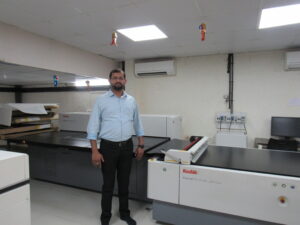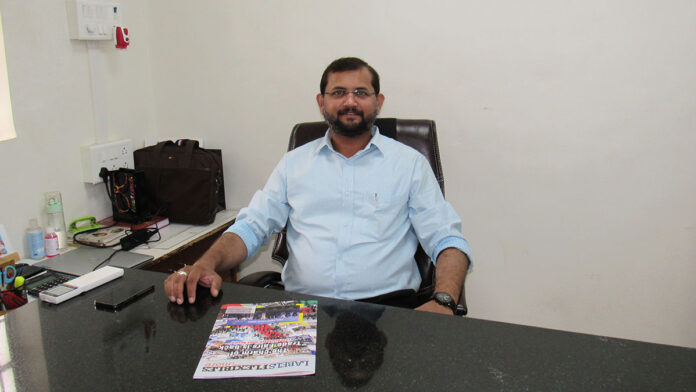Based in Pune, Nulfex Graphics is a manufacturer of digital flexography plates for various printing segments like Label, CI Flexo, Corrugation, Paper Bags and Paper Cups. Since its inception in 2019, Nuflex has recorded strong growth every year despite challenging trading conditions during the COVID-19 pandemic. They started the business with few people and now the company has a strength of more than 30 employees, in just under three years of business.
We spoke to Nikhil Puntambekar, Partner at Nuflex Graphics, about its journey of manufacturing flexo plates and choosing Miraclon as a technology partner.

Digital vs Analog plate-making process
The digital plate-making process is more specialized than the analog process. Nuflex Graphics has two different types of equipment for manufacturing plates, Miraclon’s KODAK FLEXCEL NX system (simply called FLEXCEL NX ) and thermoflexx by XSYS. FLEXCEL NX uses laser technology to lay down a perfect 1:1:1 job reproduction onto the flexo plates, whereas thermoflexx uses LAMS technology. For both these techniques, they have DuPont inline washer processing equipment.
“In the flexible packaging segment, we see more and more printing jobs being converted from Gravure to Flexo; likewise, there is a change from Offset to Flexo for Label, Paper, and Corrugation print jobs. The limitation of the Offset plate-developing process is that it is a sheet-fed printing process and not rotary printing; therefore, the post-printing operation is that much more complex. These trends are why we chose to start a digital flexo plate-making unit. Previously, due to cost advantage, convertors used to prefer analog plates for corrugation, but that is now changing too.”
FLEXCEL NX in the pressroom

“Label and flexible packaging converters are very aware of the productivity gains with FLEXCEL NX Plates, including the reduced make-ready times and ink savings it allows on press, so this is what they demand – every time.”
“This is a premium plate that delivers premium quality beyond compare. Thanks to the inherent flat top dots, ink transfer with FLEXCEL NX Plates is magnificent, and it allows for repeatably good results without any effort”
“
“For a trade shop, the FLEXCEL NX platemaking process is effortless and less time consuming than competing flexo platemaking technologies. The drying time of FLEXCEL NX Plates is also almost half that of LAMS, while FLEXCEL NX Central for automated plate layouts is very user friendly.”
“I believe the FLEXCEL NX System has the most streamlined process for producing printing plates, and because of the simplified process, operators choose it for productivity and faster operation. They can also rest assured that the FLEXCEL NX Plates will identically match the artwork and know that the converter will be pleased with the print results.”
“
Servicing During Challenging Times
“Besides Mumbai, we provide printing plates to other parts of Maharashtra and Goa. Even during the COVID-19 crisis, we supported our converter customers as best as we could. From receiving the artwork to supplying the final printing plate to the converters production floor is a service that we had incessantly delivered during the COVID-19 period.”
“Outlook-wise, Nuflex Graphics have invested in future-ready FLEXCEL NX technology to make sure that everything is streamlined and their team operates in the most efficient way, and in the end, the customer is also better supported.” said Hersh Lulla, Marketing Manager, Asia Pacific Region for Miraclon.
There are nearly a number of label converters and flexible packaging converters in Pune. Corrugation is a significant segment. Though it is an unorganised sector, there are vast numbers of corrugation packaging manufacturers since all tertiary packaging requires corrugated boxes. As more attention is given to branding even in tertiary packaging, we are starting to see four-color printing in the tertiary carton packaging boxes as well.
Trade shops need to showcase value addition
Flexographic printing plates are the most valuable consumable. Although plate cost is negligible, but it is a significant factor in print quality and a major factor in saving inks, as well as make-ready time and start-up waste. The printers should not look merely at face value or purchase price of the plate, but they should examine how the printing plate is performing and how they are getting the services that improve their ultimate output. The ability of a convertor to maximize their flexographic packaging print production process can yield significant benefits in the press-rooms and contribute to their top and bottom lines.
“The cost of raw materials is increasing; the cost of labor is also growing, as is the cost of production inputs like electricity, but comparatively, the plate costs have remained relatively stable over a very long period of time; rather, the expectation is to provide flexo plates at even lower costs. Brands and converters have escalated prices, but the price increase in line with inflationary pressures is not available to trade shops like us. However, if brands and converters want the best technology to work on their side and deliver even more significant benefits to them with improved shelf impact and improved savings through better production efficiencies, they need to understand the cost justification and partner with the right trade shop, as well as the right technology partner. That is how flexo will truly grow and win,” concludes Nikhil.












